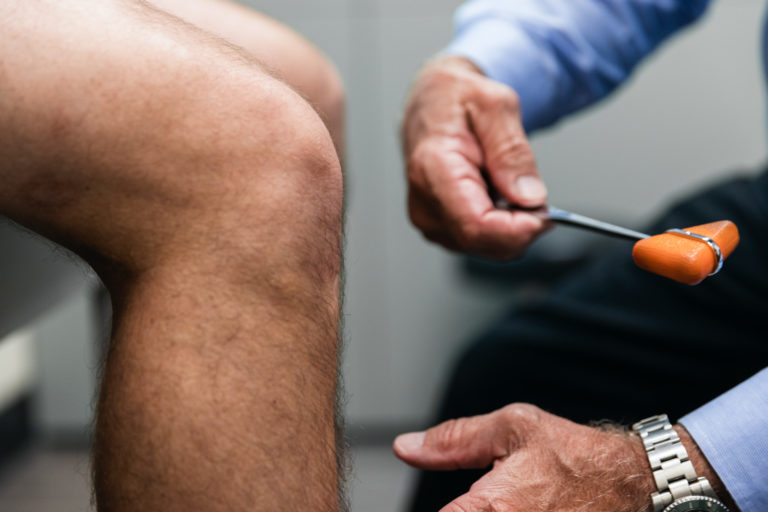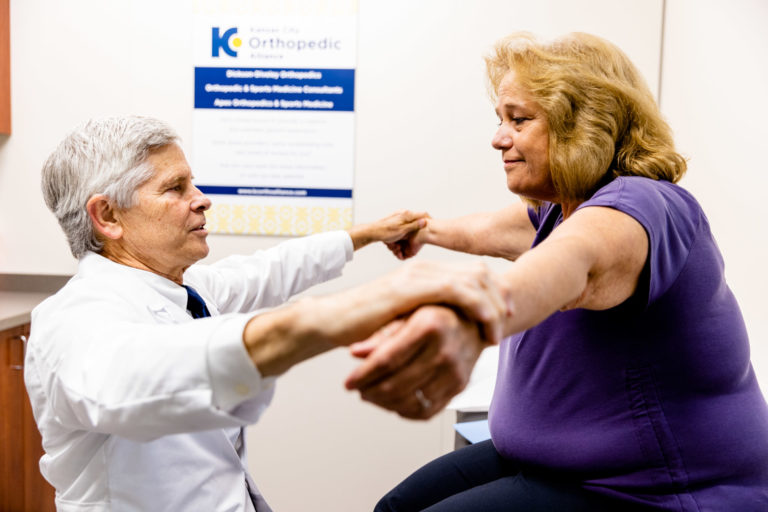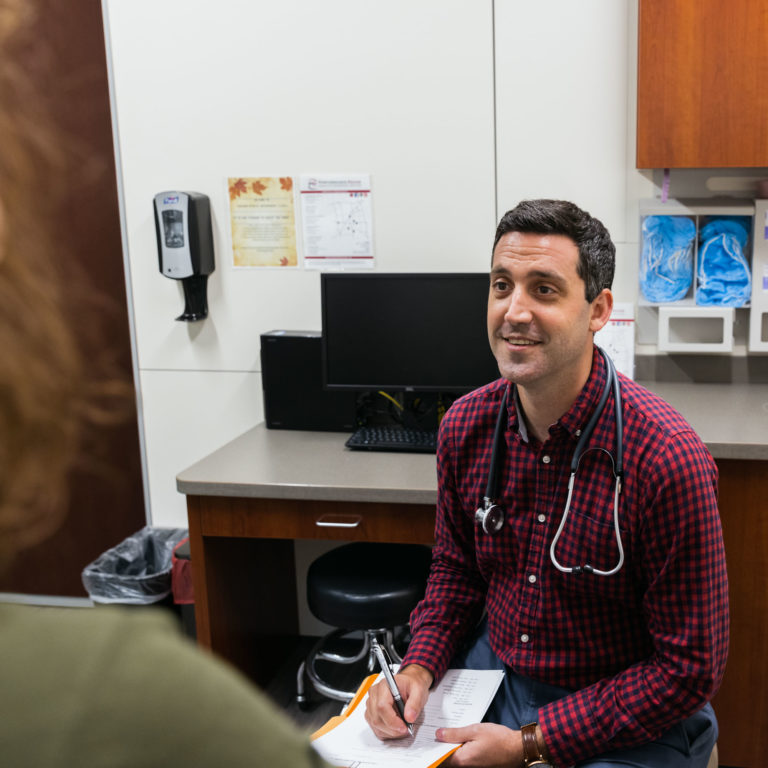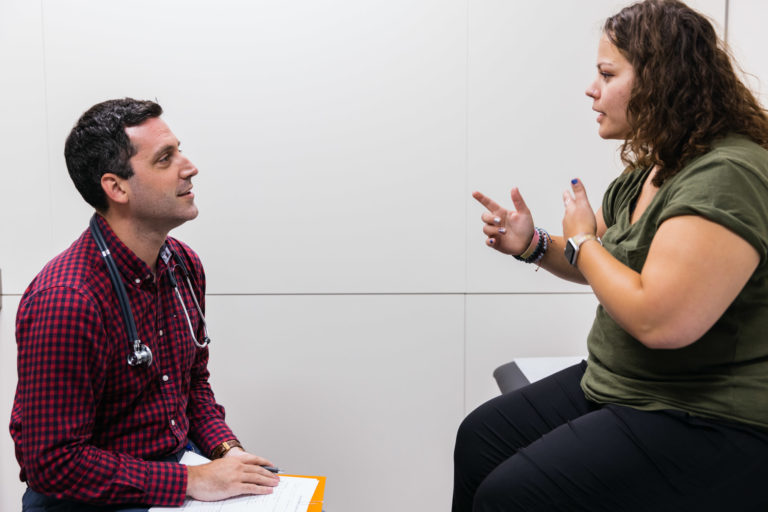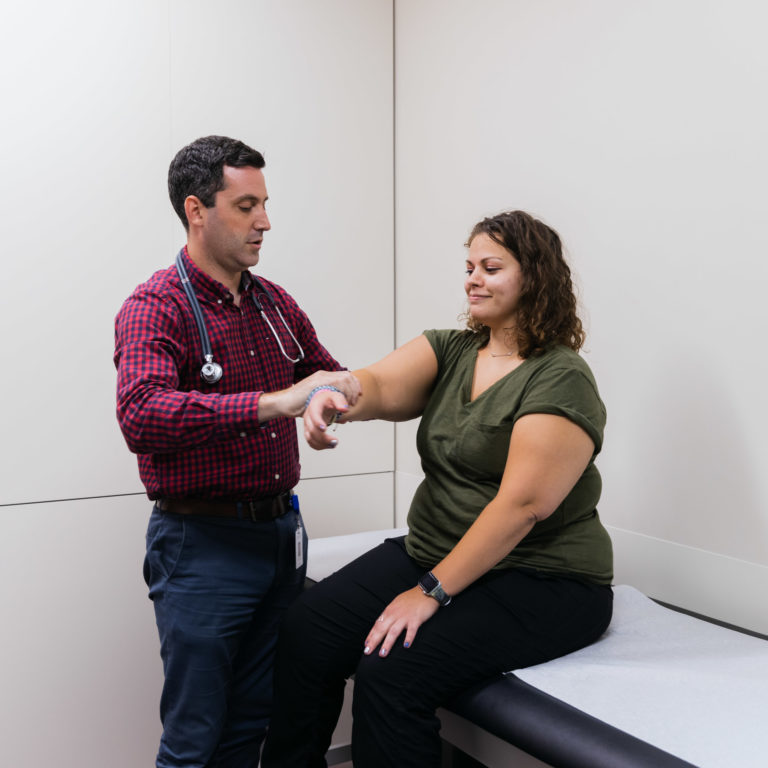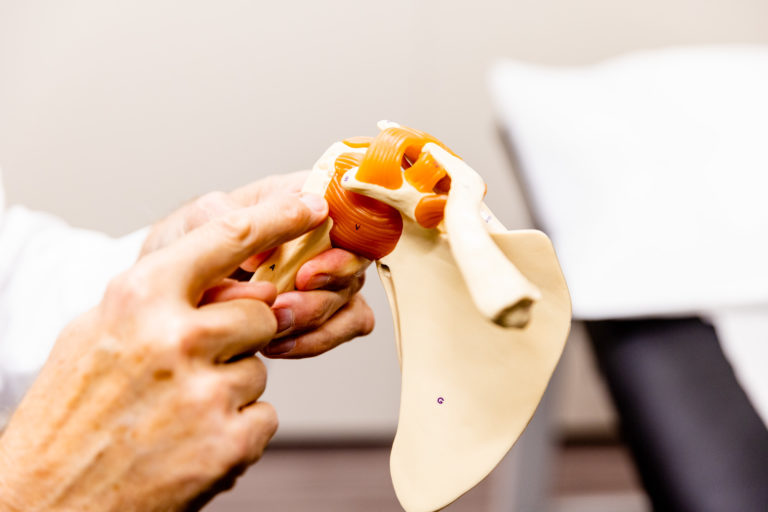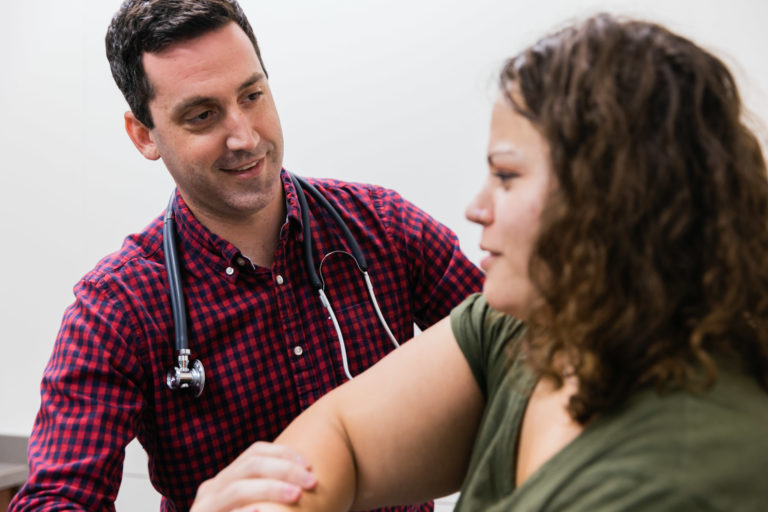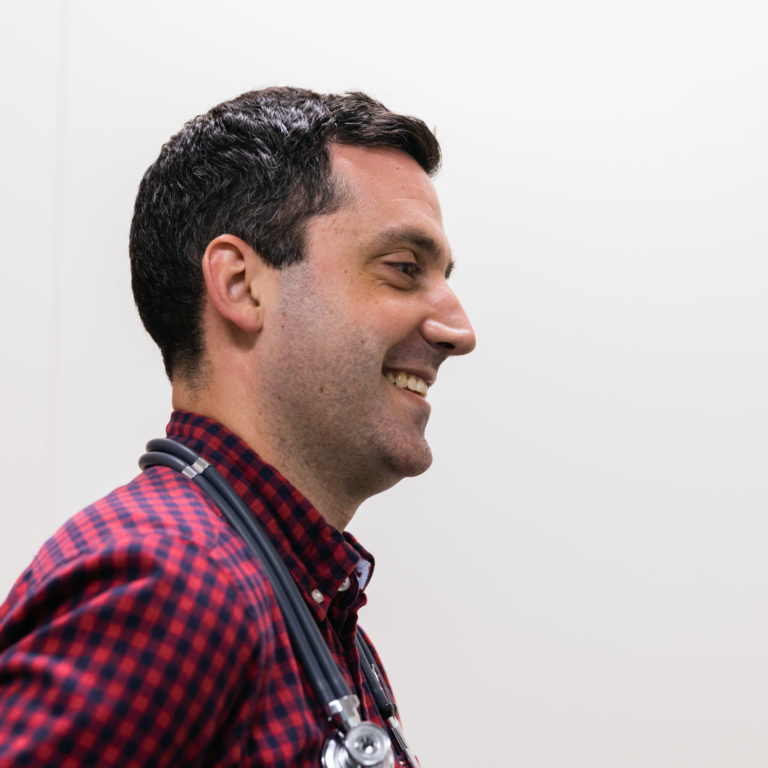Biceps Tenodesis in Kansas City
Biceps Tenodesis
Total arm care from Kansas City’s orthopedic experts.
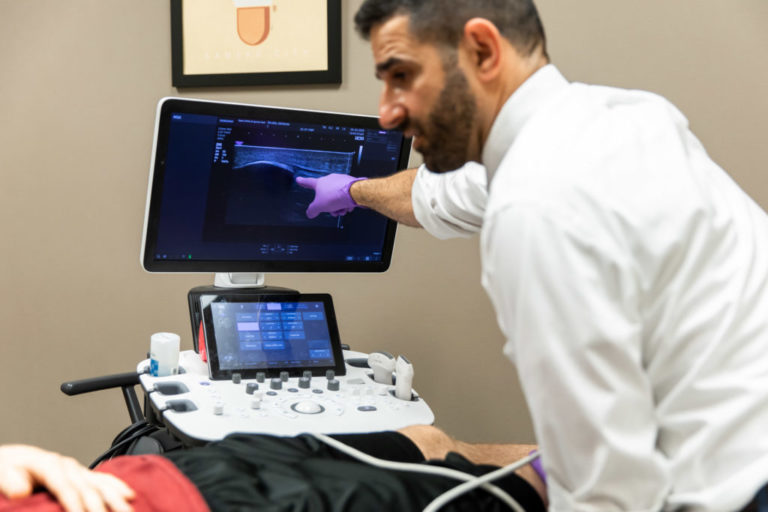
Understanding the Basics Behind Biceps Tenodesis
What is Biceps Tenodesis?
The shoulder is both a highly complex joint with many different muscles, tendons, and ligaments working together and a junction between the arm and the rest of your body.
The bicep tendon passes through the shoulder joint and attaches to the labrum, so any damage to these parts of the arm can have a ripple effect.
A tear where the bicep and labrum meet is referred to as a SLAP (superior labrum, anterior to posterior) tear, and a common treatment for this kind of injury is biceps tenodesis. Our highly-trained orthopedic shoulder physicians at Kansas City Orthopedic Alliance have the experience needed to solve a variety of shoulder issues for our patients, including Bankart tears and other injuries to the labrum.
After your initial examination with a KCOA physician, we will recommend the best treatment for your needs. Our practitioners provide the comprehensive care you need so you can return to the activities you enjoy.
Choosing biceps tenodesis is a decision that typically involves guidance from your primary care doctor and orthopedic physician.
When you choose KCOA for your biceps tenodesis in Kansas City, one of our highly-trained orthopedic shoulder specialists will conduct an initial evaluation to better understand your condition. After a complete review of your results, your provider will then discuss the best treatment option for your specific shoulder condition.
Common symptoms of biceps tenodesis include:
- Reduced movement or pain when moving your shoulder
- Shoulder or upper arm weakness
- Numb or tingling sensations in your arms
- Burning sensation in your shoulder or arms
- Completely immobile or “locked” joint
SLAP tears in the labrum can be caused by repetitive shoulder movements or acute trauma. Decreases in shoulder strength and range of motion as well as pain with movement and general instability are all common symptoms of SLAP tears that may require biceps tenodesis in Kansas City.
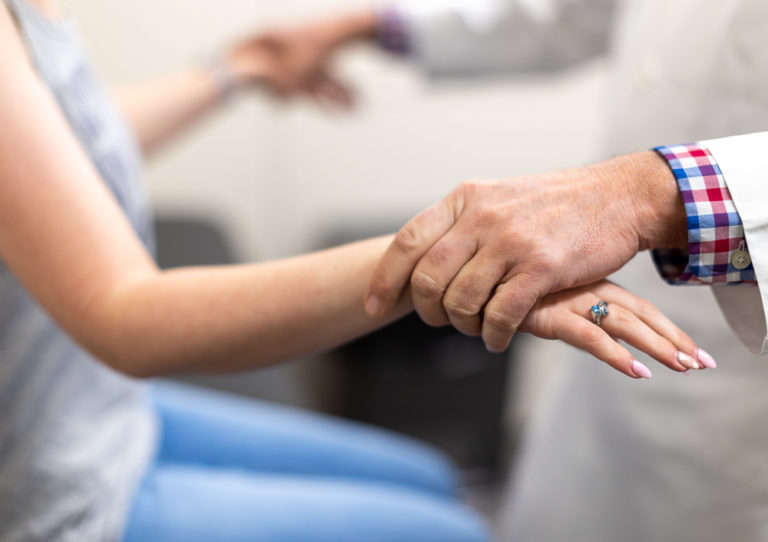
Kansas City Orthopedic Alliance Shoulder Injuries Assessment
Assessing the Injury
Finding the right shoulder treatment in Kansas City starts with an assessment.
You can think of shoulder pain as a spectrum, with some instances being more severe than others. The KCOA orthopedic specialists always focus on each individual patient and their concerns before creating a treatment plan.
Therefore, during your initial appointment, we will often ask questions such as:
- Does your pain currently limit you or your activities?
- Has your pain progressed or worsened recently?
- Have you experienced any locking in your shoulder or an inability to rotate your arm?
- Have you noticed any change in your symptoms that has made it more challenging to function?
- What are your lifestyle goals?
- How has pain affected those goals?
From there, we can decide which treatment option aligns best with your needs and lifestyle goals. After a proper assessment, we often begin with a physical examination to help determine the origin point of your pain. In some cases, advanced testing may be required for a full diagnosis.
Examination
X-Ray
Also called radiographs, an X-ray captures a picture of the shoulder. Orthopedic physicians may order an X-ray to rule out the possibility of a fracture (broken bone), osteoarthritis, or other shoulder-related conditions.
Magnetic Resonance Imaging (MRI)
MRI captures images of muscles, bones, intervertebral discs, and tendons to help provide information other tests can’t detail. During an MRI, you will lie on a table that slides into a tube-shaped scanner. The machine creates a magnetic field around you, using pulsed radio waves to form the MRI images.
Arthrogram
Our providers can utilize an arthrogram test to properly diagnose issues with the shoulder joint, including ligament, tendon, and cartilage issues. Our staff will utilize a special dye, which is injected into the joint, to see any potential issues with clear detail.
Causes
Causes of Shoulder Pain
The body has different kinds of joints, and they all face different challenges. The shoulder is a “ball-in-socket” joint, meaning it’s composed of a ball-like structure that moves inside a depression in the bone to allow for rotational movements. The ball-shaped head of your humerus (upper arm bone) that fits into the glenoid cavity in the scapula (shoulder blade) creates the shoulder joint.
In most instances, pain in your shoulder doesn’t come from these bones unless a fracture is present. Pain generators in the shoulder include disruptions to muscles, ligaments, cartilage, and tendons that surround and support this joint.
Treatment Alternatives
Non-Surgical Treatment
Surgery isn’t necessarily the first choice for treatment. Kansas City Orthopedic Alliance physicians prefer a more conservative approach to treatment, so we will typically exhaust all non-surgical options before recommending surgery. Non-surgical treatments for shoulder injuries include:
-
Physical Therapy – Movement can actually reduce pain and encourage healing in the shoulder, as movement increases circulation in the joint, supplying oxygen and other nutrients that support joint health and function.
-
Medications – Your doctor may recommend over-the-counter NSAIDs (Non-steroidal anti-inflammatory drugs, such as Advil) or prescription medications. Especially with NSAIDs, you should always talk to your doctor to ensure they are the right treatment for you.
-
Injections – Cortisone injections can help reduce inflammation in the shoulder and can even provide additional insight into the cause of your shoulder pain. The amount of relief from an injection varies by patient, but often in combination with physical therapy, patients can experience significant improvements in their function.
-
Regenerative Medicines – Regenerative medicines like stem cell injections or platelet-rich plasma can help nourish worn or damaged tissue. This option works best if you have mild-to-moderate shoulder pain.
F.A.Q.
Frequently Asked Questions
Kansas City Orthopedic Alliance is here to help.
Our care is personal. Our team is knowledgeable. And we’re more available than ever.
With access to board-certified specialists across Kansas City, we have the tools to meet almost every musculoskeletal condition.
Our Locations
Overland Park, Kansas
10777 Nall Ave Suite 300 Overland Park, KS 66211Leawood, Kansas
3651 College Blvd. Leawood, KS 66211Kansas City, Missouri
Saint Luke's Medical Plaza #1 4320 Wornall Rd., Ste. 610 Kansas City, MO 64111Belton, Missouri
Belton Regional Campus 17067 S Outer Rd #301 Belton, MO 64012Blue Springs, Missouri
St. Mary’s Medical Center, Main Entrance 203 NW R.D. Mize Road, Suite 200 Blue Springs, MO 64014Shawnee Mission, Kansas
7450 Kessler St ste. 140 Merriam, KS 66204Prairie Star (Lenexa, Kansas)
Prairie Star 23401 Prairie Star PkwyBldg. B, Ste. 220 Lenexa, KS 66227

